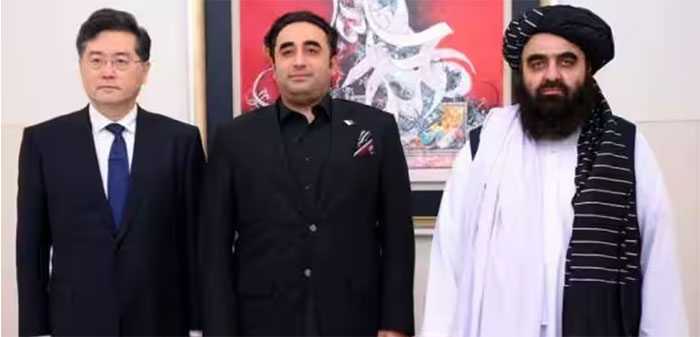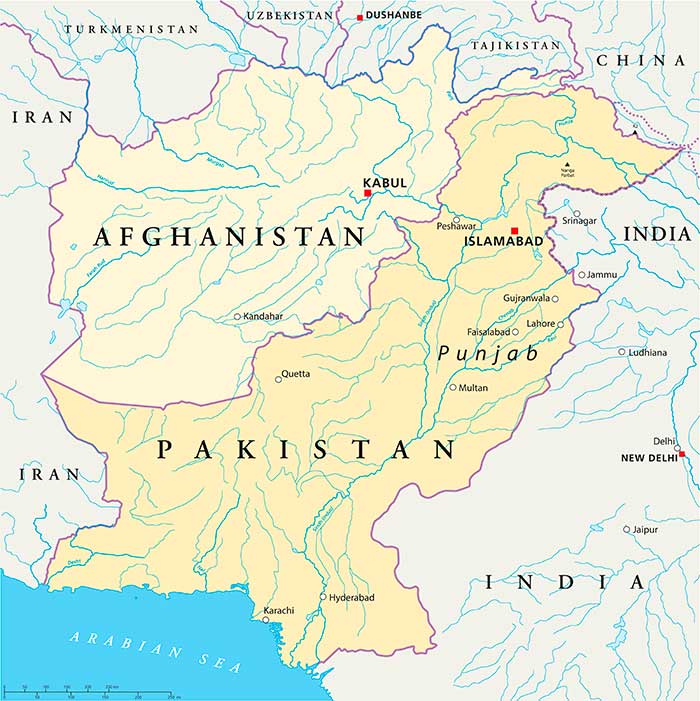Afghanistan Accepted Into China’s Belt & Road Initiative
Agreement with Pakistan for Taliban’s involvement sealed in Islamabad with projects already underway
China and Pakistan have agreed to extend the Belt and Road Initiative into Afghanistan, potentially drawing in billions of dollars to fund infrastructure projects in the sanctions-hit country, according to Pakistan’s Foreign Ministry. The agreement was reached in Islamabad on Sunday (May 28).
Afghanistan’s involvement will be targeted as part of Afghanistan’s reconstruction process including introducing elements of the US$60 billion China-Pakistan Economic Corridor (CPEC) into the Taliban-ruled country. The CPEC is China’s largest single BRI project and is designed to help industrialise Pakistan and make its economy productive.
Pakistan’s foreign ministry stated that “The two sides agreed to continue their humanitarian and economic assistance for the Afghan people and enhance development cooperation in Afghanistan, including through extension of CPEC to Afghanistan.” It said Chinese and Pakistani officials have previously discussed extending the project to Afghanistan and that the cash-strapped Taliban government has expressed readiness to participate in the project and the prospect of receiving much needed infrastructure investment.
Following the withdrawal of US troops from Afghanistan in 2021, Washington froze the overseas assets, including gold and foreign reserves of the Afghanistan Central Bank and placed the country under sanctions.
The Taliban’s top diplomat, Amir Khan Muttaqi, travelled to Islamabad to meet his Chinese and Pakistani counterparts and reached an agreement.
The Taliban have also expressed hopes for China to boost investments in the country’s rich resources, estimated to be worth US$1 trillion. The Taliban signed its first China contract in January this year with Xinjiang Central Asia Petroleum and Gas Company (CAPEIC), a subsidiary of China National Petroleum (CNPC). Worth US$541 million, the agreement is a 25-year contract to extract oil from more than 1,700 square miles of the Amu Darya basin in Afghanistan and provides the Taliban with a 20% stake for no investment, involvement or risk.

Qin Gang, China’s Foreign Minister, with Bilawal Bhutto Zardari, Pakistan’s Foreign Minister, and Afghanistan’s Foreign Minister Amir Khan Muttaqi.
The Chinese and Pakistani ministers also stressed on the need to unfreeze Afghanistan’s overseas financial assets, adding that the Taliban has been blocked from accessing about US$9 billion of Afghanistan’s central bank reserves held overseas on concerns the funds will be used for terrorism.
The United States had agreed to release half of these funds, however changed their mind after the Taliban imposed certain school and work restrictions on Afghan women last year. International aid, which accounted for 60% of Afghani public spending, was also suspended at the United States request following the withdrawal of US troops in 2021.
Since then, China, Russia, and Iran are among a handful of countries that maintain ties with the Taliban, although at present this is on an unofficial basis. None have yet established full diplomatic relations, or formally recognized the Taliban government, but they have provided millions of dollars in aid.
A UN agency said last week the Taliban requires US$4.6 billion in 2023 to help more than two-thirds of the country’s 40 million population, most of whom are living in extreme poverty. A 2022 Gallup poll showed that nine in ten Afghans find it ‘difficult’ or ‘very difficult’ to survive on their present income.
Chinese businesses have been wary of investing in Afghanistan due to attacks by the Islamic State group (ISIL) which is competing with the Taliban for influence. In December, ISIL took credit for an attack at a Kabul hotel popular with Chinese diplomats and businessmen. The East Turkistan Islamic Movement, a Xinjiang-based separatist group, is also present in Afghanistan.
Muttaqi’s second visit to Pakistan comes days after the United Nations stressed the need to engage with the Taliban rulers as Afghanistan is facing the “largest” humanitarian crisis in the world.
China has been considering Afghanistan’s involvement in the BRI since 2017, when an Afghan delegation attended the second International Belt & Road Forum in Beijing. Afghanistan delegates has also been attending Russian investment events such as the St. Petersburg International Economic Forum.
China and Russia have been active in supporting the development of a secure government in Afghanistan, and to some extent has succeeded. The Taliban represent the Pashtun tribal influence in the country, representing about 55% of all Afghans. However, statements have been made that in time they will allow greater tribal representation – although at this stage that has not yet proven possible without seeing the country descend into civil war. At present the main goal has been to prevent further violence.
China meanwhile wants to encourage peace by providing infrastructure and reconstruction into the country. It has a small border with Afghanistan and also wants improved Central Asian integration – China’s President Xi Jinping hosting four of Afghanistan’s neighbouring states at a China-Central Asian summit ten days ago in Xi’an.

Chris Devonshire-Ellis, of Dezan Shira & Associates says that “China’s Foreign Policy does tend to give priority to economic interests without undermining its domestic policy. To this end, Beijing is wary of undertaking unilateral projects in Afghanistan without assistance from Pakistan. The three sides have signed off several big ticket strategic projects, including the Trans-Afghan railway from Uzbekistan to Pakistan’s Gwadar Port and the China-Kyrgyzstan-Uzbekistan transport corridor, including both road and rail connectivity.
Agreeing Afghan transit with Pakistan however has proved a stumbling block with the Afghanistan-Pakistan Transit Trade Agreement currently suspended as regional tribal factions disagree over financial and territorial issues. Beijing will have its work cut out to bring fruitful negotiations to an area long used to violent arguments and war.”
Related Reading





